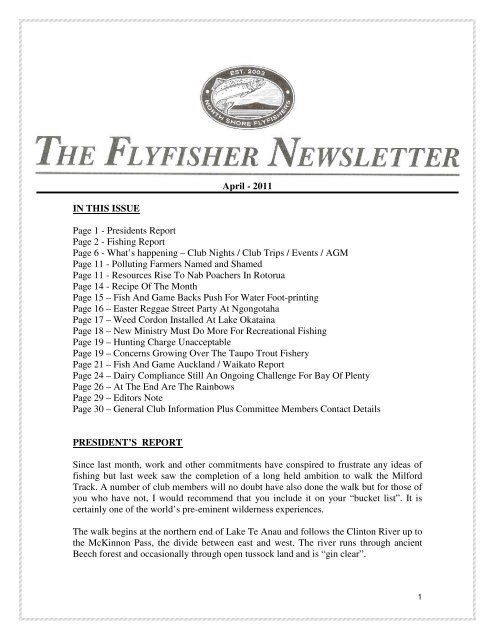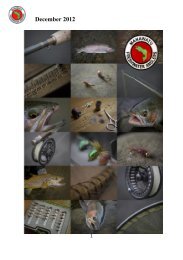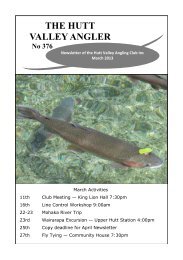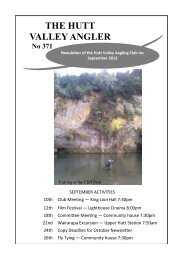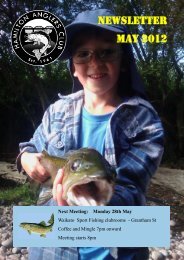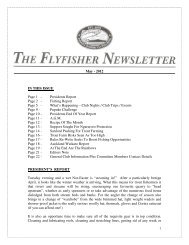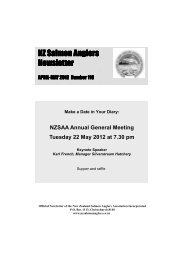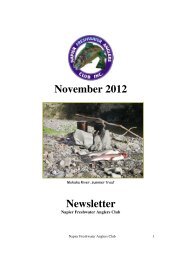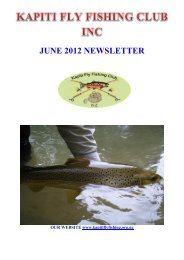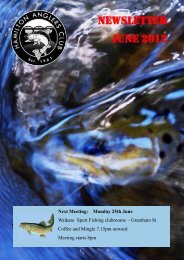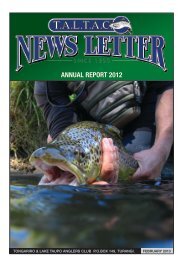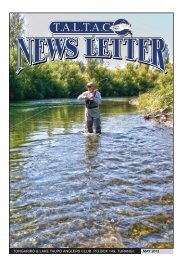April - Christchurch Fishing and Casting Club
April - Christchurch Fishing and Casting Club
April - Christchurch Fishing and Casting Club
You also want an ePaper? Increase the reach of your titles
YUMPU automatically turns print PDFs into web optimized ePapers that Google loves.
<strong>April</strong> - 2011<br />
IN THIS ISSUE<br />
Page 1 - Presidents Report<br />
Page 2 - <strong>Fishing</strong> Report<br />
Page 6 - What’s happening – <strong>Club</strong> Nights / <strong>Club</strong> Trips / Events / AGM<br />
Page 11 - Polluting Farmers Named <strong>and</strong> Shamed<br />
Page 11 - Resources Rise To Nab Poachers In Rotorua<br />
Page 14 - Recipe Of The Month<br />
Page 15 – Fish And Game Backs Push For Water Foot-printing<br />
Page 16 – Easter Reggae Street Party At Ngongotaha<br />
Page 17 – Weed Cordon Installed At Lake Okataina<br />
Page 18 – New Ministry Must Do More For Recreational <strong>Fishing</strong><br />
Page 19 – Hunting Charge Unacceptable<br />
Page 19 – Concerns Growing Over The Taupo Trout Fishery<br />
Page 21 – Fish And Game Auckl<strong>and</strong> / Waikato Report<br />
Page 24 – Dairy Compliance Still An Ongoing Challenge For Bay Of Plenty<br />
Page 26 – At The End Are The Rainbows<br />
Page 29 – Editors Note<br />
Page 30 – General <strong>Club</strong> Information Plus Committee Members Contact Details<br />
PRESIDENT’S REPORT<br />
Since last month, work <strong>and</strong> other commitments have conspired to frustrate any ideas of<br />
fishing but last week saw the completion of a long held ambition to walk the Milford<br />
Track. A number of club members will no doubt have also done the walk but for those of<br />
you who have not, I would recommend that you include it on your “bucket list”. It is<br />
certainly one of the world’s pre-eminent wilderness experiences.<br />
The walk begins at the northern end of Lake Te Anau <strong>and</strong> follows the Clinton River up to<br />
the McKinnon Pass, the divide between east <strong>and</strong> west. The river runs through ancient<br />
Beech forest <strong>and</strong> occasionally through open tussock l<strong>and</strong> <strong>and</strong> is “gin clear”.<br />
1
More importantly, it holds a significant population of trout, predominantly browns but<br />
also a few rainbows. I counted over 20 large fish <strong>and</strong> that was only where I had easy<br />
access to “spotting” areas so there are clearly many more under banks, sunken logs <strong>and</strong><br />
other hiding places.<br />
This was the first time I had been in this type of environment <strong>and</strong> I can see how, from an<br />
angler’s viewpoint, that it could become very addictive. As I pointed out in a recent<br />
article, making an angling trip a “total experience” adds a further dimension to the level<br />
of enjoyment <strong>and</strong> in the case of the Clinton River, (<strong>and</strong> I’m sure for most other nearby<br />
rivers), the pristine forest, towering mountains <strong>and</strong> inquisitive bird life, makes one forget<br />
entirely about the stresses <strong>and</strong> strains of city life. In fact, one of my companions raised<br />
the question of whether we were actually in the “real world” or was that the man-made<br />
one where we normally live.<br />
I discovered that fishing is permitted in the area if one has an appropriate Fish <strong>and</strong> Game<br />
license but signage indicated that it is of a particular category <strong>and</strong> not the normal “run of<br />
the mill” type. There is (underst<strong>and</strong>ably) a strong emphasis on the prevention of Didymo<br />
entering the catchment <strong>and</strong> the advertised fine for non-compliance is $5000! However, if<br />
appropriately licensed, the fishing opportunities are almost limitless <strong>and</strong> there are dozens<br />
of rivers <strong>and</strong> streams within the surrounding area. The Arthur River, which rises on the<br />
western side of McKinnon Pass <strong>and</strong> runs to the sea at Milford Sound also carries Brown<br />
Trout <strong>and</strong> I saw a number of large fish from some of the swing bridges. On the return<br />
journey, you enter the valley of the Eglington River, another famous trout fishing water,<br />
which, together with the Clinton, is often mentioned in Norman Marsh’s well known<br />
book, “Trout Stream Insects Of New Zeal<strong>and</strong>”.<br />
All in all, probably one of the best trout fishing experiences one can have without a rod in<br />
h<strong>and</strong>! I’m already planning the Routeburn Track for 2012 but I’ll make sure I have the<br />
old pack-away rod with me.<br />
Dave Symes<br />
President<br />
FISHING REPORT<br />
The Ohau Channel had a reasonable amount of small smelt throughout its length over the<br />
weekend, whether they came from Lake Rotoiti or Rotorua is anyone's guess though.<br />
There were fish feeding on them, though not in large numbers, nor were they of a decent<br />
size. Grey Ghosts <strong>and</strong> Silver Dorothy flies caught some of them, though a Ginger Mick<br />
or similar dark fly fished best.<br />
Hauparu Bay is always worth visiting with a view to fishing. There are two streams<br />
entering this bay, though most anglers only fish the one closest to the Angler Access. The<br />
second stream mouth is best fished from the last jetty to the right as you look out into the<br />
lake. Cast back to the corner where the stream enters or along the weed bed to the right.<br />
2
As the water is very deep close into the shore, fish come in very close both day <strong>and</strong> night<br />
so it pays to stay well away from the water when casting.<br />
Lake Rotoehu is looking the best that it has for a few years, no sign of algae bloom <strong>and</strong><br />
huge smelt cruising the shore. Many of the smelt were quite dark <strong>and</strong> well in excess of<br />
five centimetres in length. Rainbows can be seen chasing smelt around the weed beds<br />
around much of the lake <strong>and</strong> from what could be seen, the trout are larger than average<br />
for this lake.<br />
Lake Rotoma is, as always, looking superb. The clarity of the water is possibly the best of<br />
all the lakes in the region, which can make for challenging fishing. Fine tippets <strong>and</strong> a<br />
light drag are essential when fishing the shoreline at the end of the lake, alongside State<br />
Highway 30. The rocky shoreline is a very popular spawning area that is open to fishing<br />
up until June 30. The long beach to the right of the boat ramp can produce awesome fish<br />
right through until August <strong>and</strong> is worth visiting.<br />
Both the Ngongotaha <strong>and</strong> Waiteti streams have had fresh fish enter them, though they<br />
have moved up into the upper reaches fairly quickly. More rain is forecast for the coming<br />
weekend so more fish should be ready to move into both streams. The trick is not to hold<br />
off fishing until the stream is clear, but fish the still clearing water with fluoro bodied wet<br />
flies or egg patterns. Dark patterns also work well in discoloured water.<br />
Lake Rotorua has been a picture early in the morning as there has been little wind of late.<br />
The few boats that have ventured out on the lake have had some success, though the<br />
condition factor of the rainbows is still variable. Trolling off the Ohau Channel through<br />
to the Airport <strong>and</strong> out the front of Hamurana seemed to have fished well, but with rain<br />
being forecast for the weekend, trolling between Kawaha Point <strong>and</strong> the Waiteti stream<br />
mouths could produce some good conditioned fish.<br />
Rainbows around the four to five kilo mark are being caught at the mouth of the Little<br />
Waipa Stream. While this stream is not in the Rotorua area, it is an easy drive from<br />
Rotorua City <strong>and</strong> those fish being caught are actually from the Eastern Fish <strong>and</strong> Game<br />
Hatchery on Paradise Valley Road. Access to this stream mouth is off Horohoro Road,<br />
which is the second right turn between Putaruru <strong>and</strong> Arapuni Village. Horohoro Road<br />
leads back to State Highway One just North of the Tauranga turn off. A floating line <strong>and</strong><br />
st<strong>and</strong>ard Rotorua flies are all that is required. The pool above the culvert on Horohoro<br />
Road is also worth flinging a fly at, although the back cast area is limited. After dark,<br />
Doll flies or Craigs Night Time flies tied with a small amount of lumo catch well.<br />
A far as the Waikato is concerned it is now official, summer is over! All the waterways<br />
throughout the region are cooling down significantly. Like all changes there are plus <strong>and</strong><br />
minuses to be examined.<br />
On the negative side, you will probably struggle to bring Trout up to a Cicada from the<br />
deeper pools although those in shallower water may still take one. At this time of year<br />
3
follow Dave McLell<strong>and</strong>’s advice if you want to take fish on the dry fly <strong>and</strong> use Grey<br />
coloured flies like the Blue Dun.<br />
On the positive side the cooler water temperatures will be easier on the Trout <strong>and</strong> they<br />
should be more actively feeding during the day, especially the Browns. Also, in places<br />
like the Waihou <strong>and</strong> Waimakiriri there should be some bigger spawning fish coming up<br />
the river.<br />
The Waitawheta is still fishing well with the occasional fish taking the dry but most<br />
succumbing to the nymph dropper, usually a mayfly pattern like the Pheasant Tail.<br />
The Waipa <strong>and</strong> its tributaries are all fishing ok. Two weeks ago they were on fire with the<br />
Cicada but this recent cold snap has calmed things down a bit. Those using small (size<br />
14-16) Brown Mayfly nymph patterns appear to have had the best results.<br />
The Taupo area is able to be encapsulated in one word, Hard. That’s not to say that there<br />
aren’t some very nice fish about, it’s just that most people are finding them less than easy<br />
to locate. The Tongariro has been producing some very nice Browns <strong>and</strong> the occasional<br />
early running rainbow but not in any great numbers. Likewise the Tauranga Taupo has<br />
had a couple of small early season runs but it is crystal clear <strong>and</strong> low, making it tricky for<br />
even the guides. On the other h<strong>and</strong>, Lake Otamangakau is still giving up some fantastic<br />
fish, (as can be seen in the photos below), <strong>and</strong> in reasonable numbers.<br />
Finally, I put this report together through information gained from <strong>Club</strong> Members,<br />
various websites, <strong>and</strong> my own fishing experiences, (plus of course Bert Robinson who<br />
generously allows us to use his Rotorua report). If you ever have any reports / stories you<br />
would like to share please contact me <strong>and</strong> we can get them out there. Also, if you have a<br />
photo you would like to share please send it in too.<br />
Fishy Tales<br />
If you do have a report, success story, or anecdote to share then just send it to<br />
iconp@ihug.co.nz .<br />
Happy <strong>Fishing</strong> <strong>and</strong> Tight Lines - Freddy Da Fish.<br />
QUOTABLE QUOTES<br />
Flyfishing is like the legendary canary in the mine shaft. Flyfishing is the litmus test, if<br />
you will, for our environment. If we cannot protect our rivers <strong>and</strong> fisheries, or strive to<br />
make flyfishing a quality experience, our commitment to stewardship has failed.<br />
George Anderson - Can Fly-fishing Survive the Twenty-first Century?<br />
4
Above: Our own <strong>Club</strong> Secretary Roy Richardson with a very nice Big O Rainbow.<br />
Below: One of our <strong>Club</strong>’s founding members Dave McLell<strong>and</strong> <strong>and</strong> a prime lake<br />
Rainbow. Photos courtesy of Dave McLellan, (via the Tongariro River Motel website).<br />
5
LAST CLUB NIGHT<br />
Last month we had Bryce Johnson the Chief Executive of Fish <strong>and</strong> Game New Zeal<strong>and</strong><br />
talking to us <strong>and</strong> it was by all accounts quite an eye opener to some of the more political<br />
aspects of our passion. This was a very informative night <strong>and</strong> thank you once again<br />
Bryce.<br />
NEXT CLUB NIGHT – Tuesday 19 th <strong>April</strong> – 7.30pm<br />
This month we are fortunate to have Kent Fraser, author of Destination Trout <strong>and</strong> its<br />
accompanying DVD. He will be splitting his presentation into two; firstly talking about<br />
targeting Snapper on the Fly <strong>and</strong> then talking on backcountry Trout fishing. This is sure<br />
to be an interesting night <strong>and</strong> we hope to see you all there.<br />
CLUB TRIPS 2011<br />
February – Ngongotaha River <strong>and</strong> Rotorua Lakes<br />
March – Lake Otamangakau<br />
May – Ngongotaha River <strong>and</strong> Rotorua Lakes<br />
July - Tongariro <strong>and</strong> Tauranga Taupo<br />
October - Lakes Rotoaira <strong>and</strong> Otamangakau<br />
October – Lake Aniwhenua <strong>and</strong> surrounding Rivers, Phil Gates<br />
December – Tuition weekend on Ohinemuri River<br />
The NSF committee arrange various <strong>Club</strong> Trips over the year to different parts of the<br />
country. If you would like to be involved, or have an idea for a trip please let one of your<br />
committee know.<br />
NSFF WEBSITE<br />
As has been mentioned, the <strong>Club</strong> now has its own Website, www.nsff.org.nz . Thank you<br />
very much to Phil Gates who has done all the hard work in getting this set up <strong>and</strong> running<br />
for us. We are looking at having a Members photo page as well, so if you have any<br />
feedback for Phil, or information that you feel should be on the site, please contact him<br />
on mp.gates@mitgat.com .<br />
QUOTABLE QUOTES<br />
When I grow up I want to be a little boy.<br />
Joseph Heller<br />
6
D.V.D. LIBRARY<br />
The following DVD’s are available from the <strong>Club</strong> Library. If you would like to borrow<br />
one please contact Dave Symes at the next <strong>Club</strong> Night or via email, dssymes@xtra.co.nz<br />
ESSENTIAL SKILLS With OLIVER EDWARDS<br />
ESSENTIAL PATTERNS With OLIVER EDWARDS<br />
STILLWATER PRESENTATIONS With DENNY RICHARDS<br />
ADVANCE FLYCASTING DOUG SWISHER<br />
CHRIS OGBORNE’S SINKING LINE TECHNIQUES<br />
NEW WAYS OF FISHING THE CADDIS FLY<br />
NEW WAYS OF FISHING THE MAYFLY<br />
HOW TO SUCCEED ON SMALL STILLWATERS PART ONE<br />
HOW TO SUCCEED ON SMALL STILLWATERS PART TWO<br />
HOW TO SUCCEED ON RESERVOIRS PART ONE<br />
HOW TO SUCCEED ON RESERVOIRS PART TWO<br />
NEW ZEALAND FLYTYING With JOHN GIACON<br />
THE EDUCATED TROUT<br />
WEE WETS AND DOWNSTREAM DRYS With DAVE McLELLAN<br />
CLUB DVD'S<br />
If you have borrowed DVD's <strong>and</strong> have finished viewing them, please bring them back to<br />
the next meeting.<br />
WEBSITE NEWS<br />
Phil Gates has been doing some more work, (check it out), on our website -<br />
www.nsff.org.nz – <strong>and</strong> the site now has the ability to send out RSS (Really Simple<br />
Syndication) messages. All <strong>Club</strong> Members can sign up for them by going to the "Current<br />
Issues" page of the web site <strong>and</strong> clicking "RSS Feed". If you save the RSS feed as one of<br />
your "favorites" web pages, you will have a quick link to the latest comments <strong>and</strong><br />
activities of the <strong>Club</strong><br />
LAKE PUPUKE CHALLENGE<br />
On the first Sunday in May (01/05/2011), your <strong>Club</strong>, in conjunction with Hunts Sports<br />
<strong>and</strong> Trout Unlimited New Zeal<strong>and</strong>, is hosting the annual Lake Pupuke Challenge. This<br />
year’s event is timed for the weekend after the Auckl<strong>and</strong> Waikato Fish <strong>and</strong> Game<br />
Association is to release 1000 rainbows <strong>and</strong> 200 brown trout into Lake Pupuke. The<br />
Challenge starts at 7 am <strong>and</strong> goes until 3:30 pm. Weigh in will be held at the Sylvan Park<br />
reserve, on the elevated area near the car park <strong>and</strong> toilet block from 3:30 pm. Estimated<br />
length of undersized trout or trout that were released would be also appreciated. Prize<br />
giving will follow shortly thereafter.<br />
7
Beside the st<strong>and</strong>ard prizes, the <strong>Club</strong> also awards a prize for the largest trout caught by a<br />
member. The trophy being awarded is the Lake Pupuke Challenge Ian Hunt Cup, last<br />
year won by our Treasurer John Cuthbertson. This trophy will be presented at the May<br />
<strong>Club</strong> meeting to the winner.<br />
Prizes (available to all licensed participants) for this year’s event are:<br />
1. Heaviest Trout<br />
C&F Waterproof Fly Case plus $100.00 gift voucher, total value $200.00<br />
2. Second Heaviest Trout<br />
Led Lenser Head (Torch) Fire plus $100.00 gift voucher, total value $200.00<br />
3. Heaviest Trout caught by a primary or secondary school student<br />
$50.00 gift voucher<br />
4. Heaviest alternative fish species (not trout)<br />
$50.00 gift voucher<br />
5. Three drawn spot prizes for junior anglers attending weigh-in.<br />
Participants to pick numbered ticket up at weigh in station between 3.00 -<br />
3.30pm:<br />
a. Primary or secondary school student (Boy) - $25.00 gift voucher<br />
b. Primary or secondary school student (Girl) - $25.00 gift voucher<br />
c. Primary or secondary school student (Boy or Girl) - $50.00 gift voucher<br />
HUNTS SPORTS STORE, North Shore FlyFishers <strong>and</strong> Trout Unlimited New Zeal<strong>and</strong><br />
have donated prizes.<br />
If you have any questions, contact Phil Gates, whose number during the day of the<br />
competition is 021 544 212. For queries prior to the day, contact Phil on 480 2334,<br />
evenings.<br />
This is a great <strong>Club</strong> <strong>and</strong> children’s event. Let’s have a good turnout for this 2nd Ian Hunt<br />
Cup competition. See you all there.<br />
The Lake Pupuke Challenge Ian Hunt Cup.<br />
8
MAY CLUB TRIP TO THE NGONGOTAHA AND ROTORUA AREA<br />
This year’s <strong>Club</strong> Trip to fish the Ngongotaha River <strong>and</strong> the Rotorua region is taking place<br />
on the weekend of Friday 20 th , Saturday 21 st <strong>and</strong> Sunday 22 nd of May. We will again be<br />
staying at the Paradise Valley Lodge, which backs onto the river.<br />
Costs will be $75.00 each, which will cover 2 nights accommodation in the lodge <strong>and</strong> a<br />
BBQ on Saturday evening.<br />
During May this river can produce some excellent fishing for fresh run Rainbows <strong>and</strong><br />
Browns, but be warned, these powerful fish may take your fly willingly enough but they<br />
are even better at keeping it or giving it back to you, usually bent.<br />
Also, the river mouths <strong>and</strong> lake edges in the area are renowned for the quality <strong>and</strong> size of<br />
their fish. (All reports are saying that with the arrival of the Smelt back into Lake Rotorua<br />
the size <strong>and</strong> condition of the Rainbows has had a dramatic improvement from earlier in<br />
the year). So if you prefer Lake fishing or the rivers are all in flood then there are still<br />
plenty of fly fishing options available for your enjoyment.<br />
Organiser for this trip is Duncan Frew, available on 021 648 956 or iconp@ihug.co.nz .<br />
Jimmy Teen <strong>and</strong> 8pds of hard fighting Ngonga Brown Trout caught last week. Come on<br />
the <strong>Club</strong> Trip <strong>and</strong> this could be you…<br />
9
2011 ANNUAL GENERAL MEETING<br />
Notice is hereby given of the Annual General Meeting of The North Shore Flyfishers<br />
Incorporated to be held at the Milford Cruising <strong>Club</strong> 24 Craig Road Milford on the 17 th<br />
May 2011 commencing at 7.30pm.<br />
Copies of the Audited accounts will be available at the Committee table prior to the<br />
AGM.<br />
AGENDA FOR THE AGM AS FOLLOWS:<br />
1. Welcome<br />
2. Apologies<br />
3. President’s report<br />
4. Treasurer’s report <strong>and</strong> financial situation<br />
5. Set subscription rate for the year (already done)<br />
6. Election of officers <strong>and</strong> committee<br />
PRESIDENT<br />
SECRETARY<br />
TREASURER<br />
CLUB CAPTAIN<br />
COMMITTEE (5 people) required<br />
7. Notice of motions (See note below)<br />
8. General business<br />
9. AGM CLOSE<br />
NOTE: Any member wishing to place a notice of motion to be raised at the AGM must<br />
do so in writing <strong>and</strong> be received by the executive committee no later than 10 th May 2011<br />
INTERMEDIATE TUITION FISHING TRIP<br />
As a result of the continuing success of the <strong>Club</strong> Tuition Trip to the Ohinemuri we are<br />
now looking at the possibility of running an Intermediate level Tuition Trip. Peter Scott<br />
of Rod <strong>and</strong> Reel, <strong>and</strong> the New Zeal<strong>and</strong> Fly-fishing Team, has generously offered to help<br />
out again. So if you may be interested then either send in an email to iconp@ihug.co.nz<br />
or simply have a chat to any Committee Member on Tuesdays <strong>Club</strong> Night.<br />
WALKING / RIVER ACCESS WEBSITE<br />
The Walking Access Commission has put together a great new Website depicting access<br />
points to Rivers <strong>and</strong> waterways around the country. It is hard to describe all the features<br />
available on this site, but what I can say is that it is Excellent. If you haven’t seen it<br />
already then do so soon, it really is a site that needs to be looked at, time <strong>and</strong> time again.<br />
The site address is www.wams.org.nz , check it out.<br />
10
WHY WE FISH<br />
"… You must not fish for covetousness or to save money, but principally for your solace<br />
<strong>and</strong> to promote the health of your body <strong>and</strong> specially of your soul. For when you go<br />
fishing you will not want others with you as they will distract you. And then you may<br />
serve God with devotion in effectively saying your customary prayers."<br />
"A Treatyse of Fysshynge With An Angle" - 1496<br />
POLLUTING FARMERS NAMED AND SHAMED<br />
TVNZ – 19/03/2011<br />
Forest <strong>and</strong> Bird is naming <strong>and</strong> shaming regional councils with the worst results from<br />
dairy farm pollution.<br />
Advocacy Manager Kevin Hackwell said that only two of the five targets have been met<br />
in the eight years since the Clean Stream accord was created.<br />
"It is a real surprise that, as the level of serious non-compliance increased, the number of<br />
prosecutions by regional councils actually went down. It seems that the regional councils<br />
in the areas of highest offending are still not taking the problem seriously," Hackwell<br />
said.<br />
He says 16% of farms are still not complying with resource consents <strong>and</strong> some districts<br />
are especially bad. "Sadly there is still a significant minority of dairy farmers letting<br />
down the majority of producers <strong>and</strong> other New Zeal<strong>and</strong>ers," he said.<br />
Hackwell says in the Waikato <strong>and</strong> Northl<strong>and</strong> around one in every four farmers is<br />
polluting. He says Greater Wellington Regional Council has been tougher, <strong>and</strong> its non<br />
compliance rate is down to 1%.<br />
Taranaki is the only regional council to have met the 2007 target <strong>and</strong> most councils have<br />
fallen short of the earlier 50% target for 2005.<br />
RESOURCES RISE TO NAB POACHERS<br />
Anita Moran – The Daily Post – 30/03/2011<br />
As winter approaches Fish <strong>and</strong> Game rangers are gearing up to target poachers in Rotorua<br />
fisheries.<br />
Eastern Region Fish <strong>and</strong> Game officer Anthony van Dorp said in the 2009/2010 year 73<br />
11
people were caught poaching by officers in the eastern region, the majority of those being<br />
in Rotorua. The 73 people committed 128 separate offences <strong>and</strong> about a third of those<br />
people were prosecuted, Mr. van Dorp said.<br />
"This is up somewhat on recent years as we are putting more resources into this area."<br />
Mr. van Dorp said there were two different types of poaching.<br />
"Firstly, those persons who fish without a license <strong>and</strong>/or breach any of the rules <strong>and</strong><br />
regulations governing how anglers may fish.<br />
"Secondly, there is the perhaps more serious poaching which usually takes place over the<br />
winter period.<br />
"It is when trout come into streams to spawn <strong>and</strong> are targeted by poachers using a variety<br />
of implements."<br />
Mr. van Dorp said Fish <strong>and</strong> Game officers had caught poachers using a variety of tools to<br />
catch fish. He said in his experience many of the people caught poaching were also dealt<br />
with by police <strong>and</strong> other agencies for a range of offences.<br />
"Trout poaching is dishonesty <strong>and</strong> is stealing from those people who buy a license to fish,<br />
<strong>and</strong> who follow the rules," he said.<br />
"Trout poachers are not conservationists. They are selfish <strong>and</strong> the effect they can<br />
potentially have is huge."<br />
Mr. van Dorp said poaching had the potential to ruin fisheries <strong>and</strong> could cause the cost of<br />
fishing licenses to rise through increased costs to Fish <strong>and</strong> Game.<br />
He said another local issue was that Lake Rotorua was a wild fishery which was<br />
dependent on successful natural spawning of trout in its tributary streams.<br />
"Many poachers walk in the streams thereby disturbing the spawning gravels <strong>and</strong> in the<br />
process destroying, or potentially destroying trout ova."<br />
Mr. van Dorp said Fish <strong>and</strong> Game worked closely with police to combat poaching. He<br />
said officers would regularly visit problem locations <strong>and</strong> also sometimes used covert<br />
surveillance equipment to catch poachers.<br />
Those who poach spawning trout face penalties of up to 12 months' jail or a fine of up to<br />
$10,000.<br />
"Recent prosecutions for this type of offending have seen the Rotorua District Court<br />
imposing penalties of up to 280 hours' community work, forfeiture of gear used <strong>and</strong><br />
disqualification from driving," Mr. van Dorp said.<br />
12
"Other recent offenders sentenced by both the Rotorua <strong>and</strong> Taupo District Courts have<br />
been sentenced to 130 hours' community work for taking spawning trout, <strong>and</strong> prison<br />
warnings in some cases have also been given by the court."<br />
JOKE OF THE MONTH<br />
A middle-aged couple had two beautiful daughters but always talked about having a son.<br />
They decided to try one last time for the son they always wanted.<br />
The wife got pregnant <strong>and</strong> delivered a healthy baby boy.<br />
The joyful father rushed to the nursery to see his new son.<br />
He was horrified at the ugliest child he had ever seen.<br />
He told his wife: 'There's no way I can be the father of this baby.<br />
Look at the two beautiful daughters I fathered!<br />
Have you been fooling around behind my back?'<br />
The wife smiled sweetly <strong>and</strong> replied:<br />
'Not this time!'<br />
“There’s Gold in them thar waters…” Photo courtesy of James Teen.<br />
13
RECIPE OF THE MONTH<br />
The following is from The Great Trout Cookbook by Jean Melba, <strong>and</strong> looks delicious.<br />
Trout Fettuccine<br />
Serves 4:<br />
Ingredients<br />
1 Trout of 1-1.5kg, filleted <strong>and</strong> skinned.<br />
500gms fresh Fettuccine<br />
500gms white Fettuccine<br />
50gms Pine Nuts<br />
200mls Olive Oil<br />
2 crushed Garlic cloves<br />
100mls White Wine<br />
2 Egg yolks<br />
100mls fresh Cream<br />
½ bunch Basil, finely chopped<br />
200gms freshly grated Parmesan Cheese<br />
Salt <strong>and</strong> Pepper to taste<br />
4 litres of Water<br />
Mix egg yolk <strong>and</strong> cream together, beating lightly.<br />
Put 4 litres of water into a pot, add a small amount of olive oil, <strong>and</strong> bring to the boil (the<br />
oil will stop the pasta from sticking). Add the fettuccine <strong>and</strong> cook for approximately 8<br />
minutes, until the pasta is al dente. Strain the pasta <strong>and</strong> rinse with cold water.<br />
Cut the Trout into small finger length pieces <strong>and</strong> fry lightly in a large pan for 5 minutes.<br />
Then add the pasta, pine nuts, crushed garlic <strong>and</strong> wine. Cook slowly for another 5<br />
minutes, stirring from time to time.<br />
Before serving, add the cream <strong>and</strong> egg yolk mixture to the fry pan <strong>and</strong> stir <strong>and</strong> let simmer<br />
until the mixture thickens.<br />
Serve with a generous amount of chopped basil on top <strong>and</strong> add the parmesan cheese.<br />
14
FISH AND GAME BACKS PUSH FOR WATER FOOTPRINTING<br />
Fish & Game Reel Life Magazine – 1/03/2011<br />
Fish & Game NZ is supporting international calls for Global Water Footprint St<strong>and</strong>ards<br />
which would hold industries accountable for their impact on our finite water resources.<br />
“Pressure is mounting for countries to be more accountable for the water they use <strong>and</strong> the<br />
impact industries have on water scarcity <strong>and</strong> its environmental degradation,” says Fish &<br />
Game NZ chief executive Bryce Johnson.<br />
Water footprint assessments assist governments <strong>and</strong> industries to measure <strong>and</strong> underst<strong>and</strong><br />
water use <strong>and</strong> the impact on the resource throughout the supply chain.<br />
“To date, New Zeal<strong>and</strong> has failed to develop any effective measures to gauge <strong>and</strong><br />
mitigate the impact industries are having on water quality <strong>and</strong> consumption,” says Mr.<br />
Johnson.<br />
“This has resulted in water being majorly over allocated in many parts of the country,<br />
severely polluted in lowl<strong>and</strong> dairy catchments, <strong>and</strong> often simply wasted by irrigators <strong>and</strong><br />
urban centres.<br />
“This irresponsible approach to freshwater management is really going to tarnish our<br />
international image <strong>and</strong> our economy.<br />
“At the end of the day, avoiding facing up to the water management problems we have in<br />
this country is really going to hurt exporters – this Global Water Footprint initiative is a<br />
clear signal that the international community is no longer prepared to accept hollow<br />
slogans.”<br />
Mr. Johnson says New Zeal<strong>and</strong> urgently needs a measure of accountability so industries<br />
<strong>and</strong> government adopt best management practice around water quality.<br />
“If they don’t, then New Zeal<strong>and</strong> will face the consequences of consumer backlash in key<br />
export markets.”<br />
The development of the Water Footprint St<strong>and</strong>ard comes at a time when leading<br />
international companies across all sectors – including Coca Cola, Unilever, SABMiller –<br />
are awakening to the risk their impact on water resources poses to both their reputations<br />
<strong>and</strong> bottom lines.<br />
For more information contact: Bryce Johnson, Fish & Game NZ chief executive,<br />
021397897.<br />
15
EASTER REGAE STREET PARTY<br />
Cherie Taylor – The Daily Post – 8/03/2011<br />
Roads will be closed for a reggae street party as part of this Easter's Ngongotaha Trout<br />
Festival. B<strong>and</strong>s including House of Shem <strong>and</strong> Sons of Zion will perform. The concert <strong>and</strong><br />
a trout-fishing competition will see Ngongotaha transformed into one big street party<br />
during Easter Weekend as part of the first Ngongotaha Trout Festival.<br />
Event manager David Taui said the street festival had been in the planning six months,<br />
with b<strong>and</strong>s including House of Shem, Cornerstone Roots, Sons of Zion, The Real<br />
Konflikt, Moana & the Tribe, Soul2C, Fisher Kings, Major <strong>and</strong> AIO already on board to<br />
play.<br />
New Zeal<strong>and</strong>'s very own Elvis Presley, Chey Orton will bring the King of Rock's sounds<br />
to the event. There will be live music, plenty of food on offer <strong>and</strong> lots of Rotorua's<br />
culture on show throughout the weekend, Mr. Taui said. "It's going to be one big street<br />
party with lots of prizes up for grabs," he said. "We want to show the sunny side of our<br />
maunga, Ngongotaha, to the rest of the world."<br />
Trout competition organiser Brynn Kelly said the festival provided the perfect<br />
opportunity to show the rest of the country what Ngongotaha had to offer. "Let them<br />
come <strong>and</strong> fish in the greatest <strong>and</strong> most lucrative streams in Rotorua," he said. "In fact it's<br />
the best trout-fishing area in the world ... we want to lift the profile of Ngongotaha <strong>and</strong><br />
the people who live here. It's an absolutely beautiful place to live."<br />
Rotorua organisations will have the chance to hold fundraising stalls throughout the<br />
weekend.<br />
Between 6pm <strong>and</strong> midnight on Good Friday the main street in Ngongotaha will be closed<br />
to through-traffic while b<strong>and</strong>s perform during the street party.<br />
Ngongotaha Idol is also planned.<br />
The fishing competition will be between 5am <strong>and</strong> 1pm each day to allow competitors the<br />
chance to check out the rest of the festival. Prize giving will be on Easter Sunday<br />
afternoon.<br />
Free food stalls will also be set up on Easter Sunday.<br />
Entry to the Ngongotaha festival is $40 per adult with a gold-coin entry for children<br />
under 14 <strong>and</strong> pensioners.<br />
Money collected from the gold-coin entry will be given to the Red Cross to help assist<br />
<strong>Christchurch</strong> earthquake victims.<br />
16
Dirty Harry hits the Ohau Channel on Opening Day…<br />
WEED CORDON INSTALLED AT LAKE OKATAINA<br />
Media Release - Environment Bay Of Plenty – 9/03/2011<br />
An exciting initiative which began in Lake Rotoma has now been applied to Lake<br />
Ōkataina.<br />
Bay of Plenty Regional Council has installed a weed cordon around the boat ramp at the<br />
main beach on Lake Ōkataina. The weed cordon has been specifically designed to<br />
prevent the spread of aquatic pests that are present in nearby lakes.<br />
Lake Ōkataina is particularly vulnerable to invasion by two of the worst aquatic weeds,<br />
Hornwort <strong>and</strong> Egeria which can spread easily through fragments transported from nearby<br />
lakes.<br />
An isolated site of Hornwort which was discovered last year at the southern end of the<br />
lake is under active control by the Regional Council in a hope to eradicate the infestation.<br />
Bay of Plenty Regional Council Biosecurity Officer Hamish Lass said the cordon was<br />
constructed from used mackerel purse seine net donated by Sanford fisheries.<br />
17
“Shade cloth covers the top two metres of the cordon <strong>and</strong> has been designed to contain<br />
any fragments from other lakes that may have been on boats or boat trailers.” Mr. Lass<br />
explained.<br />
“When a boat enters the water, weed fragments will wash off <strong>and</strong> be caught in the net<br />
within the controlled area.”<br />
“A fish pass has also been installed so trout can still migrate along the shoreline of the<br />
lake,” Mr. Lass said.<br />
The cordon is marked out with buoys <strong>and</strong> port <strong>and</strong> starboard makers. Signs also explain<br />
the cordon’s purpose <strong>and</strong> have navigational instructions.<br />
The area within the cordon will be sprayed out annually with diquat herbicide to prevent<br />
weed growth <strong>and</strong> checked regularly for any Hornwort or Egeria incursions.<br />
Lake users have already welcomed the cordon <strong>and</strong> the efforts by the Regional Council to<br />
help maintain the lake’s quality.<br />
NEW MINISTRY MUST DO MORE FOR RECREATIONAL FISHING<br />
Press Release – United Future – 12/03/2011<br />
UnitedFuture leader Peter Dunne has greeted the decision to merge Fisheries with<br />
Agriculture <strong>and</strong> Forestry with a call for the new organisation to be more responsive to the<br />
needs of recreational fishers.<br />
“For too long recreational fishers have been the poor downtrodden cousins of our<br />
fisheries sector, the new ministry gives us a great opportunity to change that,” said Mr.<br />
Dunne.<br />
“New Zeal<strong>and</strong>ers have a long tradition of utilising our marine resources <strong>and</strong> common<br />
rights to harvest food for the table. Currently, however, these common rights are being<br />
largely ignored as recreational interests are subservient to both commercial <strong>and</strong><br />
customary interests.”<br />
“Unfortunately the recreational sector has neither the resources, or at present, the<br />
influence to effectively challenge the status quo. The new ministry should be tasked with<br />
helping to change this.”<br />
“There are two specific areas of policy I wish to see Government <strong>and</strong> the new ministry<br />
focus on.”<br />
“Firstly there needs to be work done in conjunction with the recreational sector to<br />
establish a statutory management organisation to better represent <strong>and</strong> protect the interests<br />
of recreational fishing.”<br />
18
“Secondly, a review needs to be conducted, <strong>and</strong> if necessary the Fisheries Act amended,<br />
to ensure that the recreational user’s share of the quota is not further undermined by the<br />
unsustainable activities of the commercial sector.”<br />
“These two initiatives alone would go a long way to addressing the concerns of the<br />
recreational fishing sector, while also establishing a more level playing field across<br />
fisheries as a whole.”<br />
“The more than 1 million recreational fishers in New Zeal<strong>and</strong> <strong>and</strong> the ongoing<br />
sustainability of our fishery deserve far better representation than they currently enjoy. I<br />
hope the new combined Ministry can assist in achieving that,” said Mr. Dunne.<br />
HUNTING CHARGE UNACCEPTABLE, SAYS DUNNE<br />
Radio New Zeal<strong>and</strong> – 20/03/2011<br />
United Future leader Peter Dunne says the decision by forest management company<br />
Timberl<strong>and</strong>s to charge people for access to the Kaiangaroa forest south of Rotorua is<br />
unacceptable.<br />
From 1 May, those wanting to access the forest to hunt, fish, or shoot game birds, will<br />
have to register with a security firm <strong>and</strong> pay $50 for a permit.<br />
Mr Dunne says that goes against the well-established common right of New Zeal<strong>and</strong>ers,<br />
to fish <strong>and</strong> hunt without charge.<br />
He says Timberl<strong>and</strong>s' decision is an abuse of power.<br />
Mr Dunne says there has been a long st<strong>and</strong>ing access issue between Timberl<strong>and</strong>s <strong>and</strong><br />
anglers who want to fish the Rangitaiki river which needs to be resolved.<br />
CONCERNS GROWING OVER THE TAUPO TROUT FISHERY<br />
DOC Media Release – 29/03/2011<br />
As the Taupo region begins to look forward to the coming winter <strong>and</strong> the onset of<br />
tradition winter pursuits like skiing <strong>and</strong> fly fishing, there is considerable concern among<br />
anglers <strong>and</strong> angling businesses over the state of the Taupo Fishery.<br />
In spring the lake fishing started well with large numbers of smaller fish just under the<br />
legal length, <strong>and</strong> very high catch rates. However, as summer progressed the fishing in the<br />
space of several weeks suddenly became hard, <strong>and</strong> the Department of Conservation’s<br />
smelt monitoring programme also showed a lack of smelt along the lake shore. Smelt are<br />
the primary bait fish in Lake Taupo, <strong>and</strong> make up the large proportion of the diet of trout<br />
in the lake.<br />
19
As a result of environmental factors the smelt numbers in the lake went through a major<br />
decline 3 years ago, <strong>and</strong> this was made obvious by the poor condition of the trout in the<br />
lake at that time. “The situation appears different this time” says Glenn Maclean,<br />
Technical Support Manager of the Department of Conservation, “as we are seeing<br />
amongst the catch some very good trout, which is a vast improvement on recent years.<br />
We are also getting reports that the good fish which are being caught have stomachs full<br />
of smelt. However there just aren’t a lot of trout about <strong>and</strong> that is something of a concern.<br />
There is no escaping that the fishing has been hard work in recent months. As we expect<br />
the trout to follow the smelt in the lake either the smelt have moved out into the open<br />
waters away from where anglers fish, or alternatively become very scarce. Smelt<br />
abundance is very difficult to monitor <strong>and</strong> predict.”<br />
“We are very aware of the underst<strong>and</strong>able concerns the community has over the fishery”,<br />
says Dave Lumley, Area Manager for the Department of Conservation “<strong>and</strong> it would be<br />
great to be in a position to definitely say what is going on out in the lake in terms of smelt<br />
production. For now, we can’t provide that advice, but we are working hard to firstly<br />
measure the smelt population using complex acoustic techniques <strong>and</strong> if there is a<br />
problem, to underst<strong>and</strong> what it is.<br />
Theories abound as to what may be happening in the great lake, but data is sketchy about<br />
the lake ecosystem. One thing that is known is there have been subtle changes in how the<br />
ecosystem of the lake functions, but the department doesn’t know yet whether these<br />
changes have an effect on the smelt <strong>and</strong> trout. “Unfortunately if there is an issue as a<br />
consequence of these changes in the little animals or zooplankton that live in the lake <strong>and</strong><br />
which feed the smelt then there is no quick fix”, warns Glenn, “as there is no point<br />
releasing more trout if there is nothing to feed them.<br />
At this point there is no obvious reason why the fishery should not be fine but the next<br />
few months will begin to provide some answers, as the spawning runs begin <strong>and</strong> the<br />
Department is able to get a better assessment of the numbers <strong>and</strong> condition of trout in the<br />
lake. However, recent improvements in the lake fishing give hope that the trout have<br />
spent the summer out in the open waters rather than disappeared all together.<br />
For more information:<br />
Contact - Glenn Maclean - Programme Manager Technical Support<br />
Taupo-nui-a-Tia Area Office<br />
20
AUCKLAND / WAIKATO REPORT<br />
Whakapapa drift dive<br />
Trout numbers continue to increase in the upper reaches of the Whakapapa River. The<br />
1995/96 eruptions of Mt Ruapehu severely depleted the trout population in the<br />
Whakapapa, <strong>and</strong> for several years the river ran milky with volcanic ash with the riverbed<br />
covered in volcanic debris. Recovery only started in 2003 but since then trout numbers<br />
have continued to increase. For example, in 2002 we saw only one large rainbow trout on<br />
the entire dive (2.5km) despite good visibility but this year we counted 35. However the<br />
fish are not evenly distributed but have a clumped distribution with 18 trout, including<br />
eight rainbows, observed in just one pool while no fish were observed in three pools.<br />
Generally trout are more abundant in the largest pools, especially those pools that have an<br />
area of deep water (>3m), presumably available as a refuge, <strong>and</strong> a long run of 1-2m deep<br />
water leading into the pool providing good feeding sites. No trout were observed in short,<br />
shallow pools (
New stile <strong>and</strong> access sign at the end of Stone Jug Road, Kakahi.<br />
Angler access map<br />
The Walking Access Commission has an excellent new website that will allow you to<br />
easily identify l<strong>and</strong> open to public access, including public access to <strong>and</strong> alongside rivers.<br />
The website can be viewed either as a st<strong>and</strong>ard topographical map or as an aerial, <strong>and</strong><br />
shows marginal strips, Crown L<strong>and</strong>, esplanade reserves, conservation l<strong>and</strong>, formed <strong>and</strong><br />
unformed public roads. However the website is still a work in progress <strong>and</strong> some public<br />
access is not yet included – for example, the “<strong>Fishing</strong> Reserves” alongside rivers in the<br />
South Waikato District have not yet been marked. The website address is<br />
www.wams.org.nz If you have any access issues/inquires that you would like addressed<br />
by the Commission they can be contacted via the website.<br />
Arapuni fishing competition<br />
The Te Awamutu Fish <strong>and</strong> Game <strong>Club</strong> again ran their annual fishing competition on<br />
Lake Arapuni to provide data for the management of this popular fishery. Neil Hoyes was<br />
the winner of the Bill Sullivan Memorial Trophy with the largest trout a 2.73 kg rainbow.<br />
But the top junior wasn’t far behind with Kaley Mexted entering a 2.72 kg brown. Most<br />
anglers found the fishing hard perhaps due to high water temperatures <strong>and</strong> calm weather.<br />
22
Some anglers blamed the bright full moon. Overall not ideal conditions <strong>and</strong> not much<br />
improvement expected until the weather cools.<br />
The majority of fish entered were hatchery-reared rainbows that were released as<br />
yearlings (12 cm). Over the next three years we’re trebling the number of rainbows<br />
released into Arapuni with liberations occurring every 4 months rather than just once a<br />
year. This will be a trial <strong>and</strong> closely monitored with fin-clipped <strong>and</strong> tagged trout.<br />
Four wild brown trout were l<strong>and</strong>ed – the first time since 2008 that a brown trout has been<br />
entered in the contest. Over the previous nine competitions only eleven browns had been<br />
entered of which five fish were from hatchery liberations. Over the last year there has<br />
been a notable increase in the numbers of browns being caught in the hydro-lakes .<br />
Neil Hoyes (on right) receives the Bill Sullivan Memorial Trophy from Te Awamutu Fish<br />
<strong>and</strong> Game <strong>Club</strong> president George Brocklehurst.<br />
23
Where to go in <strong>April</strong><br />
In <strong>April</strong> it usually pays to put in the extra effort <strong>and</strong> avoid the more frequently fished<br />
waters where the fish are now well educated. In this category you would have to include<br />
the Whanganui <strong>and</strong> the Whakapapa, both rivers having been heavily fished by the Taupo<br />
guides this summer. But there are many small rivers that rarely see anglers, either<br />
because a longish walk or a polite request to a l<strong>and</strong>owner is required, sometimes both.<br />
Occasionally the extra effort doesn’t pay off, but it’s much more likely that you’ll find a<br />
river with plenty of good trout <strong>and</strong> no footprints.<br />
<strong>Fishing</strong> on the hydro-lakes should pick up once there have been a few frosts, perhaps<br />
later in the month.<br />
John Carey had to recut an old track to get down to this South Waikato spring creek but<br />
it was clearly worth the effort.<br />
Ben Wilson - Fisheries Manager - bwilson@awfg.org.nz<br />
DAIRY COMPLIANCE STILL AN ONGOING CHALLENGE FOR BAY OF<br />
PLENTY<br />
Bay Of Plenty Regional Council – 5/04/2011<br />
Routine farm dairy effluent compliance monitoring in the Bay of Plenty has again<br />
highlighted the ongoing challenges of consistent compliance across the region.<br />
24
This year’s results are similar to last year’s results where some areas have improved <strong>and</strong><br />
others have worsened.<br />
Bay of Plenty Regional Council Group Water Management Manager Eddie Grogan said<br />
that while there had been some highlights of the season including Rotorua’s significant<br />
improvements, overall there had been a marked drop in performance across the region.<br />
“Of the 354 dairy sites inspected this season, just 72 percent achieved full compliance.<br />
Unfortunately, the performance rate has deteriorated from 79 percent last year,” he said.<br />
Mr Grogan said the increased level of significant non-compliance is the most concerning<br />
factor for this year’s compliance inspection with 47 cases (13 percent) reported.<br />
To be rated as significant non compliance there must either be a discharge to a waterbody<br />
or a serious breach of consent which could result in a discharge to water.<br />
“Reduction of the significant non compliance category is the industry’s primary focus. It<br />
is unfortunate that the considerable effort so far from Federated Farmers, Dairy NZ <strong>and</strong><br />
Fonterra has not yet impacted on overall compliance figures,” Mr Grogan said.<br />
“We are witnessing the same repeated issues of non-compliance; irrigators <strong>and</strong> ponds are<br />
not being managed properly due to lack of gear maintenance, lack of staff training, <strong>and</strong><br />
certainly lack of pond storage.”<br />
The Regional Council continues to work on a number of initiatives to improve<br />
compliance figures. One change is a big shift by farmers towards incorporating storage<br />
back into effluent systems.<br />
“The improved use of pond storage has been a focus for the dairy industry, <strong>and</strong> this is<br />
being strongly supported by the Council, with increased resource consent terms reflecting<br />
the infrastructural investment that farmers are now making on their systems,” Mr Grogan<br />
said.<br />
“A new calculator tool is also used widely by Bay of Plenty dairy professionals <strong>and</strong><br />
council to help farmers calculate how much storage is needed to get through particularly<br />
wet periods.”<br />
Rotorua farmers made a significant improvement on their compliance figures this season.<br />
Rotorua recorded poor results last year with about half of the farms inspected rating as<br />
significantly non compliant. This season only three of the 25 farms inspected were rated<br />
significantly non compliant.<br />
“A working party that was formed as a result of the 2009 Rotorua Audit appears to have<br />
been successful in changing behaviours <strong>and</strong> getting agreement on accepted practices.<br />
This was one of a number of successful initiatives undertaken in the Rotorua catchment<br />
<strong>and</strong> we plan to roll these out in other areas,” Mr Grogan said.<br />
25
“It is clear that we have a long way to go with Bay of Plenty farmers to achieve our goal<br />
of 100 percent compliance. Whilst it is good to see progress in some great initiatives, we<br />
need farmers to see the urgency <strong>and</strong> make compliance a priority with their farm<br />
management.”<br />
Clear water, big Brown Trout, <strong>and</strong> hardly anyone else about…it must be South Isl<strong>and</strong><br />
back-country fishing. Photo courtesy of Jack Russell.<br />
AT THE END ARE THE RAINBOWS<br />
by Hugh Creasy<br />
The phone calls were made, the door-knocking done <strong>and</strong> Les would do the driving. I had<br />
no excuse for not going, but I have grown reluctant to test new water, especially if it<br />
involves hours of driving. I have grown lazy, comfortable with the familiar, even if the<br />
reaches <strong>and</strong> pools of loved streams no longer produce the rich catches of past seasons.<br />
Perhaps they no longer produce the fish because I have no longer the energy required to<br />
cover the distances of my youth. I fish with a lazy cast, mostly indifferent to the result,<br />
<strong>and</strong> my pleasure comes from movement of water <strong>and</strong> the life it carries, the birds <strong>and</strong><br />
changing seasons. A fish seen is exciting, <strong>and</strong> a fish caught makes the heart beat faster,<br />
but a blank day is no less pleasurable. I see no point in pursuing a limit or competing for<br />
26
the highest number of fish l<strong>and</strong>ed. The best caught fish is one that took the best presented<br />
fly, from the best cast of the day. Its size is immaterial.<br />
The river we were visiting flowed out of the Tararua Range, <strong>and</strong> many years ago I caught<br />
my first trout in its upper reaches. It was a peculiar introduction to the sport. I was<br />
h<strong>and</strong>ed a rod <strong>and</strong> spinner <strong>and</strong> was told to go to the top of a hill <strong>and</strong> look down into the<br />
valley. There I would see a pool <strong>and</strong> in it were trout. If I cast the spinner into the pool I<br />
would catch a fish. So I did <strong>and</strong> returned to the farmhouse with the fish. A day or two<br />
later I was h<strong>and</strong>ed an old .303 rifle <strong>and</strong> was told to go to the same hill <strong>and</strong> if I looked<br />
down into the valley, I would see a deer, <strong>and</strong> I was to shoot it. I did that, too, then went<br />
back to get a tractor with forks on the front <strong>and</strong> brought the deer back to a shed where I<br />
gutted it under supervision. I was in my early teens, <strong>and</strong> from that time until a decade<br />
later I could not underst<strong>and</strong> why people would talk about the hardships of hunting <strong>and</strong> the<br />
skills of trout fishing. From personal experience I knew they required neither.<br />
At the same time I was reading Swallows <strong>and</strong> Amazons by Arthur Ransome, <strong>and</strong> was<br />
intrigued by the Lake District life <strong>and</strong> wanted to read other works by the same author. I<br />
came across his Rod <strong>and</strong> Line in the library, <strong>and</strong> his account of fly fishing, its frustrations<br />
<strong>and</strong> difficulties I found fascinating, but it wasn’t till I was an adult that I had my first<br />
taste of fly fishing on the Wainuiomata River. From then on I was hooked, both by the<br />
physical act of casting, <strong>and</strong> by the life of the river. I discovered mayflies <strong>and</strong> caddisflies<br />
<strong>and</strong> their delicate grasp on life, their fragility in an often violent <strong>and</strong> tempestuous habitat.<br />
I resolved to imitate them <strong>and</strong> purchased a fly tying kit <strong>and</strong> a book to guide me.<br />
That was when I<br />
discovered the skills<br />
of fly fishing. I<br />
followed the<br />
instructions of John<br />
Veniard, Keith<br />
Draper <strong>and</strong> Tony<br />
Orman. Orman<br />
introduced nymph<br />
fishing into New<br />
Zeal<strong>and</strong> in the<br />
1970s, <strong>and</strong> created a<br />
probably unintended<br />
revolution on the<br />
Tongariro River<br />
when the new skills<br />
of nymphing up<br />
stream met the<br />
traditional wet fly methods casting downstream. In the early days it was illegal to use<br />
lead in the tying of nymphs, <strong>and</strong> it took many turns of copper wire to impart enough<br />
weight in a fly to take it to where the fish were.<br />
27
We used extra long leaders, sometimes out to 5 metres or more to allow the nymph to<br />
sink. <strong>Casting</strong> such flies was hard work until carbon fibre came on the market, but some of<br />
the old glass rods were beautifully balanced <strong>and</strong> marvelous to cast. I used a Fenwick 8<br />
weight <strong>and</strong> could put 30 yards past the tip on a good day, but the diameter of the rod’s<br />
first section built up huge air resistance, <strong>and</strong> a day’s casting would leave me with an<br />
aching shoulder.<br />
On smaller rivers I used a Trent 6 weight, considered a real lightweight 40 years ago. A<br />
kea on the Crow River chewed the cork off the grip <strong>and</strong> forced me to buy my first<br />
Killwell carbon fibre rod, <strong>and</strong> the difference in weight <strong>and</strong> ease of casting was pleasantly<br />
obvious. Carbon fibre has become commonplace in rod design, but in the early days of its<br />
use it was not uncommon for breakages to take place at critical times. I was fishing the<br />
Tauranga Taupo with my new rod when half the tip snapped during a back cast. Apart<br />
from a slight jolt I never noticed it <strong>and</strong> put a heavy shoulder into the forward cast. The<br />
rod tip flew through the air <strong>and</strong> clouted me on the ear. My companions found it hilarious,<br />
but after a week of hard fishing two more had broken, both American br<strong>and</strong>s. Killwell<br />
replaced my rod immediately <strong>and</strong> I was back on the river in a day. The American rods<br />
had to be returned to their manufacturers <strong>and</strong> took months.<br />
I also found that<br />
the flies I tied<br />
looked nothing<br />
like the store<br />
bought ones<br />
other anglers<br />
used, though I<br />
was never<br />
disadvantaged<br />
on the river or<br />
the lake by the<br />
odd concoctions<br />
I tied. While<br />
size mattered it<br />
was as much the<br />
action of the fly<br />
in the water that<br />
caught fish. Dry<br />
fly fishing was<br />
different. Quality hackles <strong>and</strong> colour were important <strong>and</strong> matching the hatch evened up<br />
the odds.<br />
Anyway, my fishing days have come full circle, <strong>and</strong> I am once again approaching the<br />
river first encountered in my callow youth. Les <strong>and</strong> I walked to the river carrying<br />
spinning gear in our bags. It was more an exploratory trip than a serious fishing venture,<br />
so I was not too disappointed when I found that I had left my reel behind. I still had my<br />
camera <strong>and</strong> I took pictures of the pools <strong>and</strong> runs <strong>and</strong> Les casting a zero gram spinner into<br />
28
the pools. We frightened half a dozen good fish over the next few hours but I think a dry<br />
fly in the evening will have the best chance of success.<br />
It’s probably a bit late in the season to get really serious about it. Autumn rains will raise<br />
the water levels <strong>and</strong> some of the pools may well become un-fishable, but next season<br />
we’ll come with fly rods <strong>and</strong> serious intent.<br />
EDITOR’S NOTE<br />
Recently there has been a fair bit said about ensuring public access to our waterways, <strong>and</strong><br />
fair enough to, but with that access comes responsibility. So here are a few reminders of<br />
our responsibilities to the l<strong>and</strong>owners through whose property out favourite river may<br />
run.<br />
1) If a gate is open or closed, leave it that way.<br />
2) Do not take a Dog onto farm l<strong>and</strong> without the express permission of the<br />
Farmer, <strong>and</strong> even then only if it is trained to not harass stock.<br />
3) Do not light a fire on farm l<strong>and</strong> without the express permission of the<br />
Farmer, <strong>and</strong> even then only if it is safe.<br />
4) Walk around, not through, Stock or Crops.<br />
5) Do not tear branches off overhanging trees because they ‘get in the way of<br />
your casting’.<br />
6) Take your litter home with you.<br />
7) If you have permission to take your car onto the property then ensure that<br />
it is parked in such a way as to not block access to gates.<br />
8) Do report any stock in difficulty to the Farmer.<br />
FISHING FUNNIES<br />
29
(Opinions expressed in this Newsletter are those of the individual contributors <strong>and</strong> not neccessarillary those of North Shore Flyfishers Incorporated)<br />
MEMBERS FEEDBACK<br />
We, your committee, are always trying to give you what you want.<br />
But are we??<br />
In order for us to do our job properly we need to have your feedback, positive or<br />
negative. For example, have you been on a club fishing trip? Did you enjoy yourself?<br />
What would you change, if anything? <strong>Club</strong> nights – what would you like to see more of?<br />
Less of? In short, talk to us.<br />
The contact details of all your committee members are listed at the end of every<br />
newsletter. So if you have something on your mind let us know.<br />
Thank you - Your committee<br />
NSFF CLUB MERCHANDISE<br />
Cap – $15.00 Inclusive of GST<br />
Green or Beige, one size fits all, with embroidered badge.<br />
Embroidered Cloth Badge - $7.50 Inclusive of GST<br />
Brushed Brass Metal Pin Badge - $12.50 Inclusive of GST<br />
If anyone is interested in purchasing these products please either place an order at <strong>Club</strong><br />
Nights or at Hunts Sports.<br />
Meetings held the 3 rd Tuesday of each month at 7.30pm:<br />
Milford Cruising <strong>Club</strong>, 24 Craig Road, Milford, North Shore City<br />
NORTH SHORE FLYFISHERS EXECUTIVE<br />
<strong>Club</strong> Patron - Ian Hunt<br />
President - Dave Symes 486-6257 Takapuna dssymes@xtra.co.nz<br />
Secretary - Roy Richardson 415-8950 Coatesville roy@location.co.nz<br />
Treasurer - John Cuthbertson 413-6993 Greenhithe john.cuthbertson@nz.pwc.com<br />
Magazine - Duncan Frew 021 648 956 Torbay iconp@ihug.co.nz<br />
Committee - Phil Gates 480-2334 Northcote phil@mitgat.com<br />
Members Brendan James 021 595 305 Mairangi Bay cheekyrooster@gmail.com<br />
Hamish Murray 021 807769 Milford HMurray@civica.co.nz<br />
Dennis Smith 376-3375 Herne Bay de.smith@xtra.co.nz<br />
Jules Wyatt 09 420 5699 Warkworth jsmw@xtra.co.nz<br />
North Shore Flyfishers Incorporated: P.O. Box 31-387, Milford, North Shore City<br />
30


